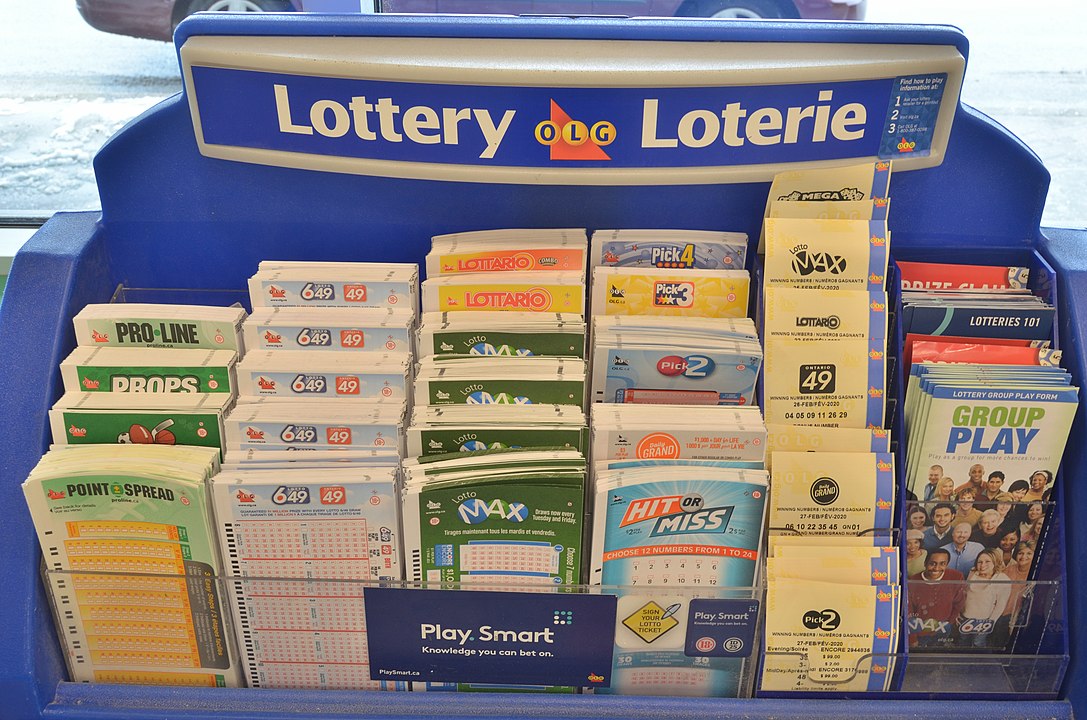Canada News
Ontario’s gambling profits flow from a hidden tax on the vulnerable

FILE: OLG lottery tickets (Photo by Raysonho @ Open Grid Scheduler / Scalable Grid Engine – Own work, CC0)
Ontario Lottery and Gaming (OLG) is down on its luck. On top of this spring’s leadership and layoff controversies, the corporation needed to be put on financial life support by a $500-million government loan when pandemic closures cut off most of its revenue. But there’s a more serious problem plaguing Ontario’s gambling industry. The government of Ontario is addicted to gambling money — a hidden tax on the province’s most vulnerable citizens that harms the very people the government has a responsibility to help.
Pre-pandemic, OLG was a lucrative source of revenue for the Government of Ontario. The corporation generated $2.5 billion for the provincial treasury last year — the province’s largest source of non-tax revenue, as OLG is quick to point out. Yet Ontario’s gambling scheme is a tax in all but name. Lottery and casino profits are piped directly into the Consolidated Revenue Fund the same as income and sales taxes, and the government relies on gambling money to finance core public services.
Yet Ontario’s gambling tax is regressive. Our recent report, titled Pressing Its Luck: How Ontario Lottery and Gaming can work for, not against, low-income households, demonstrates that gambling taxes collect a greater share of income from the poor than from the rich. Households in Ontario’s lowest income quintile (the lowest-earning 20 percent of households in the province) are likely to spend more than 4.5 percent of their incomes on gambling each year — two-and-a-half times more than households in the highest-earning quintile, who spend less than 2 percent. (The average annual after tax income of the lowest quintile is $18,738 and the actual spending on gambling is $920, whereas the average annual after tax income of the highest quintile is $103,950 and the actual spending on gambling is $1,803).
The progressive income tax system, in contrast, collects nearly 10 times more from the wealthiest Ontarians compared with the poorest. The gambling tax burden also disproportionately harms other vulnerable Canadians, including those with lower levels of education and Indigenous communities.
These figures cannot be dismissed by labelling gambling a “voluntary tax” contributed by citizens who have freely chosen to participate. The problem with such a “free will” argument is not just that it ignores the evidence that shows the government’s gambling scheme to be inequitable and regressive, but that it fails to account for the ways in which the system is designed to overcome individual players’ wills.
If half of the province’s gambling tax is collected by machines designed to override players’ conscious control of their spending, this tax cannot be labelled voluntary.
In the same way that social media platforms are carefully engineered to keep users scrolling, slot machines are designed to maximize players’ time and spending with features that encourage distorted perceptions of the game. These features include “near misses”— where the display of symbols makes it appear that the player was close to winning, even though the outcome of each play is completely random. There are also losses framed as wins, where audio and visual effects celebrate a player “winning” an amount less than he or she wagered, even though the player lost money. If half of the province’s gambling tax is collected by machines designed to override players’ conscious control of their spending, this tax cannot be labelled voluntary. Ontario’s gambling sector relies heavily on slot machines: around 56 cents of every dollar Ontario has received from OLG since 2000 has come from slots.
Problem gamblers, meanwhile, are disproportionately responsible for financing Ontario’s gambling industry, contributing up to 24 percent of gambling revenue despite making up only 1 to 2 percent of the population. Players whose voluntary control has been overpowered by addiction are painfully aware that their decision to spend money on gambling is not a free choice.
Government-run gambling is not simply meeting a demand: pervasive government advertising actively encourages Ontarians to gamble more. We analysed the marketing expenditures OLG notes in its annual reports. Adjusting for inflation, OLG has spent an average of $320 million a year on marketing over the past two decades — more than $6 billion in total. This aggressive promotion is conspicuously inconsistent with the strict marketing rules for alcohol and tobacco, other potentially addictive products whose sale is limited to adults (and, let’s remember, whose sale is still market-driven rather than monopolized by the state). In 2018, OLG’s marketing spending ($282 million) was nearly four-and-a-half times more than its spending on problem gambling prevention and treatment ($64 million). Halving OLG’s marketing budget and boosting funding for problem gambling services would help reorient the corporation’s priorities.
Disentangling gambling money from legitimate tax revenue by moving OLG profits into a specific fund — preferably aimed at relief of poverty — would be the equivalent of the government admitting it has a problem.
It’s time for Ontario to reform its gambling scheme so that OLG works for, not against, the province’s most vulnerable. Disentangling gambling money from legitimate tax revenue by moving OLG profits into a specific fund — preferably aimed at relief of poverty — would be the equivalent of the government admitting it has a problem, admitting that it has harmed the public it is intended to protect, and forming the first steps to making direct amends. If Ontario reformed gambling, it could use the proceeds to boost the income equality or savings of low-income households instead of taxing them disproportionately to support the rest of the province.
There are several policy approaches Ontario could take to gambling reform. One option is to return OLG profits directly to the poor through cash transfers. Instead of keeping OLG revenue for itself, the government could use the profits to fund a new benefit for the province’s neediest households: let’s call it the Ontario Gaming Equality Benefit (OGEB). Such a system could be tied to income levels, based on the same sliding scale used for, say, the Canada Workers Benefit. OGEB could be used to enhance existing cash transfer programs like Ontario Works or the Ontario Disability Support Program (ODSP). As with other transfers, OGEB could be designed to help families support their kids, giving a boost those who have to cover child-related expenses.
Alternatively, gambling profits could be used to incentivize savings by contributing to savings accounts for low-income families. This policy might follow the RESP model: the government tops up the savings account by a certain percentage of the account holder’s contributions. In a more ambitious model, the government matches (up to a cap) the saver’s contributions. An American example of the latter program is individual development accounts (IDAs), which are designed to help low-income participants save for specific investments like post-secondary education, home ownership, or small business start-up expenses. Canada tested an IDA program in the early 2000s, and the results suggest a matched saving program would have a positive impact on the savings habits of low-income households.
If Ontarians want the excitement of chance and the thrill of winning, the province could offer the opportunity to channel those desires toward saving with prize-linked savings (PLS). In savings accounts that follow the PLS model, account holders forgo some or all of the fixed interest they would normally earn on their savings in exchange for the chance to win a prize. These accounts have proven popular when introduced: Save to Win, a PLS product offered by credit unions throughout the United States, has seen great success since its launch in 2009; Walmart customers moved more than $2 billion through a PLS feature on the retailer’s prepaid cards in the program’s first two years of operation; and the lottery bonds offered in the United Kingdom are held by a third of the country’s population. Research suggests PLS products are particularly appealing to low-income savers and can increase total saving.
Ontario’s gambling scheme is ripe for reform. The pandemic has highlighted both the importance of improving financial security for Ontarians and provided a unique opportunity for the province to cut its gambling addiction cold turkey: with casinos shut down and OLG revenue plummeting, the costs of getting clean have never been lower. It’s time for government to kick its gambling habit for good.
This article first appeared on Policy Options and is republished here under a Creative Commons license.





















